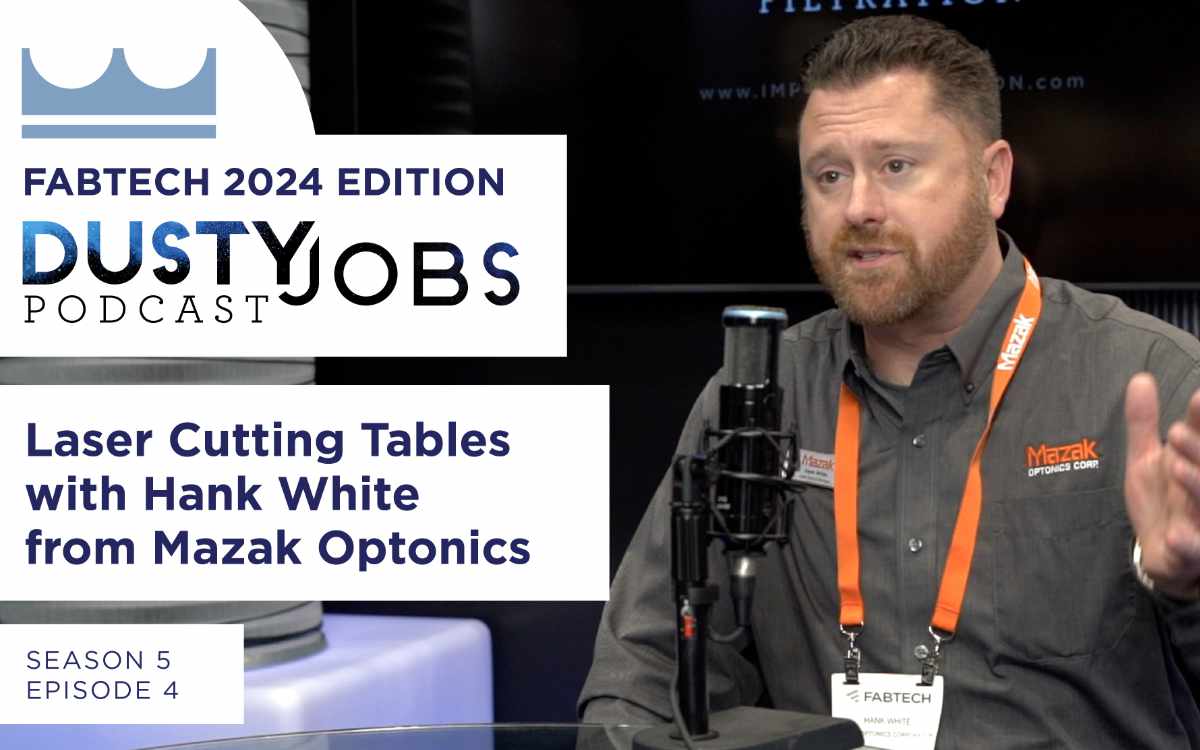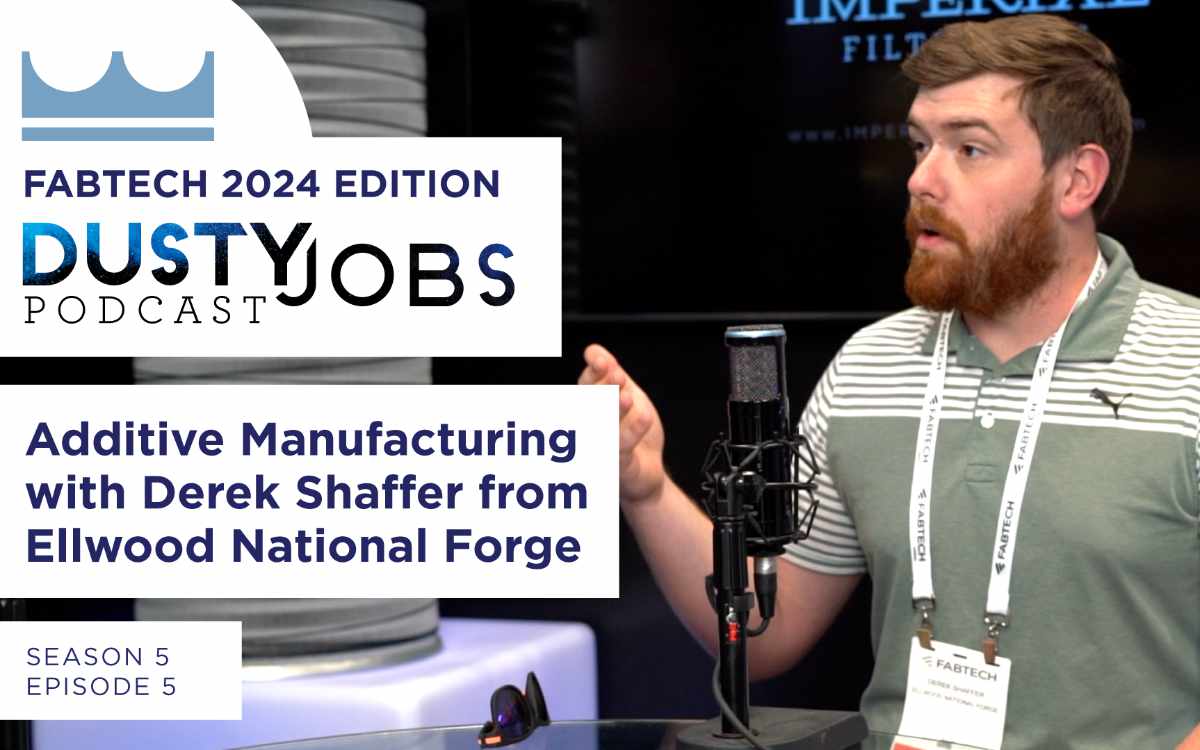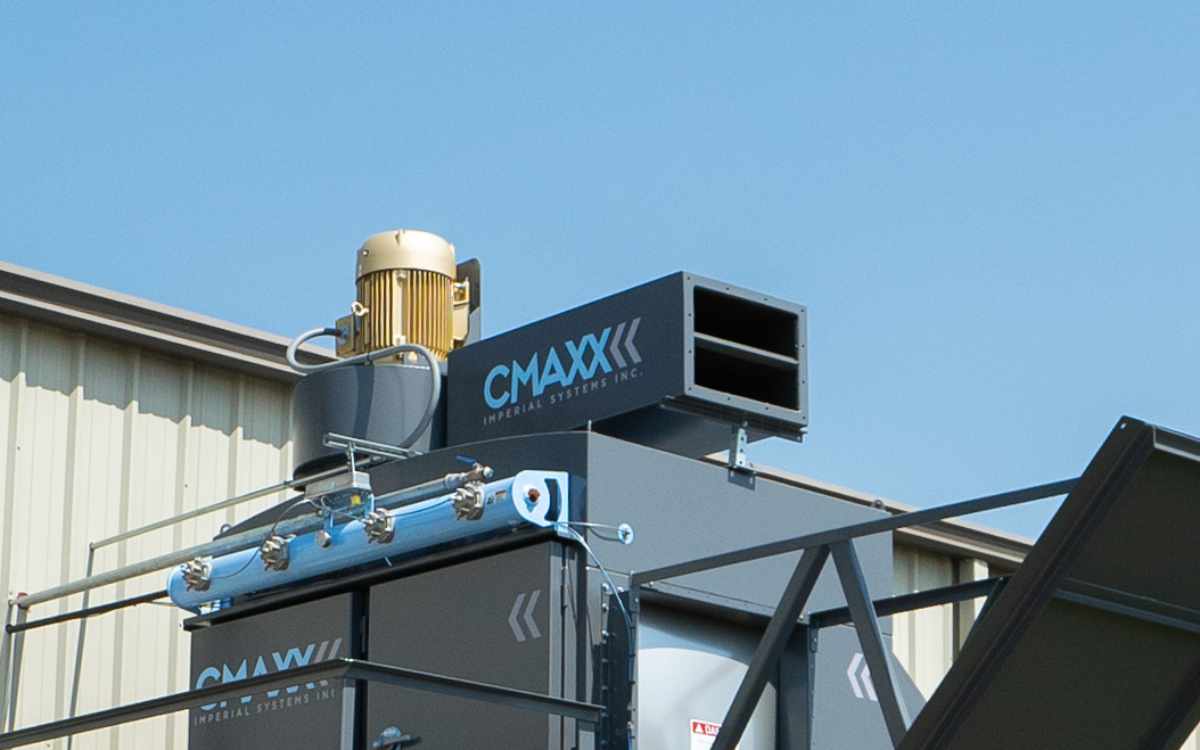This is the last Dusty Jobs Podcast episode from Fabtech 2023. In this episode we talk with Luke Surratt from Mazak Optonics Corp. Luke talks about some the new laser cutting technology Mazak has to offer as well as new automation. He also talks about their service and installation offerings.
Narrator: Welcome to the Dusty Jobs podcast from Imperial Systems. Industry knowledge to make your job easier and safer.
Donovan: Hello and welcome to another episode of the Dusty Jobs podcast. We’re still at Fabtech, day four. Joining us now is Luke Sarat from Mazak. How you doing Luke?
Luke: Good. How about you?
Donovan: Well I am – I’m glad to be sitting down. It’s been a long show. How about you?
Luke: Yeah, same. Ready to go home.
Donovan: Exactly, yeah, yeah. So we’re finally wrapping it up here. Do you guys have a good show so far?
Luke: Excellent show. One of the best in in my tenure here at Mazak. You know a lot of good boot traffic, a lot of good leads, a lot of new stuff, a lot of exciting things to see.
Donovan: Yeah, yeah, and we’ll get into it in a minute why a lot of people came into your booth. How did you get into this industry? Today we kind of have a lot of students walking around and what’s your role over at Mazak? What do you do there?
Luke: So I’m general manager of customer service. Been at Mazak Optonics almost 22 years. Started out of college as a field service engineer. Did multiple jobs throughout our service group.
Donovan: So field service engineer. What’s that?
Luke: So traveling, installing, servicing our equipment Monday through Friday. Seeing the country on Mazak.
Donovan: Yeah there you go. There you go. So some of these young people that might be a career they would be interested in something like that. So yeah sorry keep going.
Luke: Yeah so did that for about 10 years or so. Then ended up having a family. So moved more into an in-house role. Service supervisor, was training supervisor. I ran our installation group for about eight years. So I was installation manager and then moved to general manager of customer service. So service, support, basically anything customer facing is underneath me.
Donovan: Well that’s incredible. That’s great because that just shows that one, if you’ve been with a company that long – great company.
Luke: Yep.
Donovan: Two, that they promote from within and guys like you who are now in upper management, you got there because you know what’s going on below. You know everything your guys are going through you’ve gone through it yourself and that’s just great when you can see that in a company that you know you can really relate to the guy who’s out there traveling. You’ve done it.
Luke: Too well sometimes. But yeah I mean it’s it’s been a great company. It’s been a great ride. You know one thing that’s kept me there is our technology. Constantly advancing. Constantly changing. There’s always something new, always something you can learn.
Donovan: So well well let’s get to that something new. That’s why you probably got a lot of people in your booth. You guys had something to come out this year, right?
Luke: Yeah. So we showed a couple new things this year at the show. First – sorting robot. So it’s a pick and place robot. We have it on the… we have a seven kilowatt Neo.
Donovan: Pick and place?
Luke: Yeah. So we got a seven kilowatt Neo. Seven kilowatt fiber laser with a KST automation which is your raw material and your skeletons end up right above the two PC. Small footprint and then it comes out to a third position with an actual robotic arm that is taking the parts out of the skeleton and placing them on pallets.
Donovan: Okay so unlike some other tables, table’s gonna you’re gonna have a piece of metal out and then it’s gonna slide in – it’s gonna get cut. And then and then it’s gonna slide back out. And then once it gets back out of the unit there’s gonna – you guys have a robot now that pulls all those parts off.
Luke: Yeah so it actually comes out your standard laser has two pallet changers. So it comes out to your cutting position and then like a loading and unloading style position. So it comes out to a second position and you could put the whole nest back up in the tower. Traditional kind of loading and unloading of a laser. Or it can come out to a third position where the robot is and actually pick the parts out of the sheet. Once it’s done picking the parts it’ll go back into that second position and unload the skeleton into the automation.
Donovan: Oh, so does it know from the program how to organize those parts also?
Luke: Yes. Yes all out of the programming software. So the same software that’s driving the laser, the NC code, to cut the parts is driving the sorting program.
Donovan: So I could have possibly three or four different pieces on one cut and the robot will know how to sort them and put them in the appropriate piles or places.
Luke: Correct.
Donovan: Wow that’s got to save some time there.
Luke: Yeah. Yeah I mean that’s you know in this industry everybody’s hurting for one thing right now and it’s people. Skilled people. You know most shops you go to have two or three people with a lot of lasers that are shaking and sorting parts all day long and this is just a solution for our customers to eliminate the manpower of sorting parts.
Donovan: Right. Right. And then it’s it’s uh it’s gonna keep things safer a little bit too, right? Oh you know not not as much handling not as much attention for people cutting or dropping something on themselves.
Luke: Yeah I mean it it’s not gonna call in sick it’s gonna show up. Yeah it’s gonna work. Nights and weekends.
Donovan: Yeah. Well the shop can that work lights out.
Luke: Yes it can.
Donovan: So you could you get at the end of the day you could load that up and then come back in the morning and all your parts are sorted there.
Luke: Yep. Ready to go for next process in the next morning.
Donovan: So we were talking to a couple other people earlier in the day about plasma tables. And when we talk about a laser table, how hard is it for someone to learn how to use that table? Is it is it pretty easy? I mean if there’s someone out there that one of these young people and they’re listening they’re going oh I never thought I could have a job as a laser table operator. I mean is that something that would require a college degree?
Luke: Most, no. No, it would not require a college degree even to come you know start out with us you know we promote a lot like you were talking earlier from within. You know a lot of younger generation you know know what they’re doing, got a good head on their shoulders. They’ll come into Mazak and we’ll start them on a path to become a field service tech. We do a lot of training and growing from within, as well as going into the workforce. There’s really not a big difference from operating a plasma table to a laser. It’s a different technology. The M and G code, the programming, most of it’s all the same.
Donovan: So but it’s not it’s not overly complicated is what I mean. Do you think I could do it?
Luke: Yeah.
Donovan: Well if I could do it probably a lot of people out there could do it. So, well that’s great because that’s just another opportunity for you know young people coming out of high school, coming out of trade schools that they could learn this job, learn this field. And I mean you guys are selling a lot of these things, right?
Luke: Oh yeah.
Donovan: So there’s gonna be a need for people to be out there and running them.
Luke: There’s a need for running them. There’s a need for people to service them. There’s need all the way around. You know, manufacturing has kind of gotten a bad wrap in the industry, you know of you go in to your guidance counselor showing you a Ford Model T plant. But that’s not manufacturing these days. You know shops are clean, very environmentally friendly and safe, and you know most shops we go into now painted floors very nice facilities, you know. It’s not the manufacturing what people think about there’s a ton of technology in manufacturing. You know many of the shops got a AGV’s running around moving the material from place to place, things that you wouldn’t even think about.
Donovan: Well and I don’t I don’t think we’re ever gonna go backwards either. Everything is just gonna keep getting more advanced. And I’d say if you’re a young person coming out of school right now it’d be a great field to start looking into.
Luke: Oh yes, for sure.
Donovan: Because you can learn it now and keep going because like you said things just keep getting better. You guys just came out with the sorting robot that wasn’t even a thing six years ago that people were thinking about. And you guys – did you guys come out with a new laser this year?
Luke: Yes we did. We also debuted here at Fabtech our larger platform laser. It’s a 4.2 meter bed by 2 meter bed so 4.2 by 2 larger platform.
Donovan: That’s big.
Luke: Yes it is. And 20 kilowatt. So up until this week you know the highest laser power Mazak was doing was 15 kilowatt. So now we’re up to 20 kilowatt.
Donovan: So what’s that additional kilowattage? What’s that allow you to do?
Luke: So it allows us to do more capacity – thicker material, you know, that two inch aluminum or that two inch stainless but that’s not really the core of the market for that machine. The core is to be able to take your mid-range material so I’d say 3/8’s up to 3/4 and cut it faster. You know 10 years ago if we were sitting here everyone was cutting with oxygen to help accelerate the process to help the melding process of the material. That’s what you need to use on a lower powered laser to cut thicker material. Now in that leaves an oxide edge on the side of the part. So everyone would have the second process in it for paint or powder coat. You know get that oxide off the edge. Where cutting it with nitrogen or shop air for an assist gas. You don’t have the oxidation. So now as the power increases the capacity to nitrogen or oxygen cut increases and it’s much faster.
Donovan: That makes a lot of sense. So you can cut faster and cleaner.
Luke: Yes.
Donovan: So if you bought a new laser from you guys with the robot basically you could go right out of that process into powder coating if you needed.
Luke: Yes. Yeah. Powder coat weld paint. Doesn’t matter.
Donovan: So you can almost eliminate with your guys new system you can eliminate three steps in the process. Of what it takes to get things done.
Luke: Yeah. Or not have to invest much in your powder or your paint system. You know it not always was a secondary process to get the oxide off. A lot of places would put extra steps in the wash cycle for their paint system. Which costs money and time as well.
Donovan: Right. Right. Yeah. And everybody’s trying to be more efficient. Nobody wants things to take longer. Well that’s that’s exciting stuff. That’s exciting stuff. So just trying to think through anything else that you guys might… you guys do all your own service work like we were talking about earlier. Yep. Guys are install service full turnkey.
Luke: Yeah. Full service. You know Mazak we’ve had lasers in the US since 1986 and we still service and support everything back to 1986. Full part stock service. Capacity people.
Donovan: Oh wow. That’s impressive.
Luke: Yeah. So you know you buy something from Mazak you know a lot of the competitors other industries will throw you to a third party after seven to ten years. Not us. We are a hundred percent will work on everything we’ve ever sold.
Donovan: Well that’s great. That’s great. Well hey I know it’s been a long week.
Luke: Yes it has.
Donovan: We’ve all had a long week and I appreciate you just giving us a couple minutes to come talk.
Luke: I appreciate you guys taking the time.
Donovan: Yeah. Yeah. And so is there anything else you want to share about if anybody’s trying to get a hold of Mazak, if they’re interested in a laser. What’s the best way to do that? What’s the best way to look you guys up?
Luke: The best best way generally is to jump on our website. You know MazakOptonics.com. Can connect with us there.
Donovan: And you guys have a showroom locally, too, correct?
Luke: Correct. We have a showroom. It’s in Elgin, Illinois which is about 30 miles here from downtown Chicago.
Donovan: Yeah. So if someone wanted to come out and actually see one working in person, and they didn’t make it to Fabtech they could come out and see you guys.
Luke: Yes they can.
Donovan: So that’s great. Well Luke, thank you so much for coming on. Go check out Mazak on their website. I bet you guys got some stuff on YouTube and other things too.
Luke: Yes we do.
Donovan: They’re on LinkedIn and you can find us on all those platforms too. Facebook, LinkedIn, YouTube, TikTok. We’re on them all. So feel free to check us out on those and until we talk to you next time stay healthy stay safe.
Luke: Okay. Thank you.
Narrator: Thanks for listening to the Dusty Jobs podcast. Breathe better, work safer.









